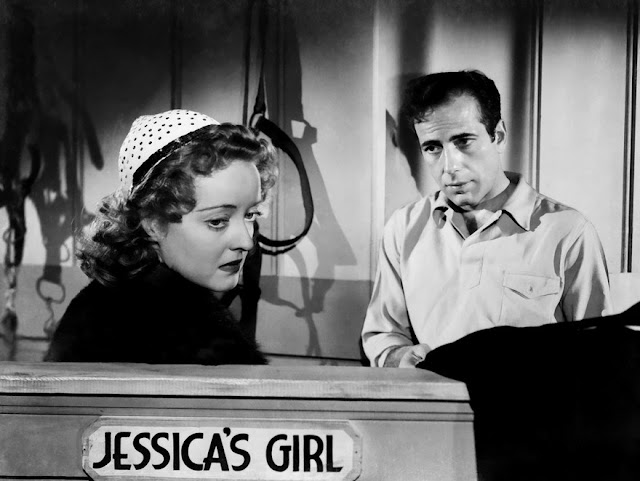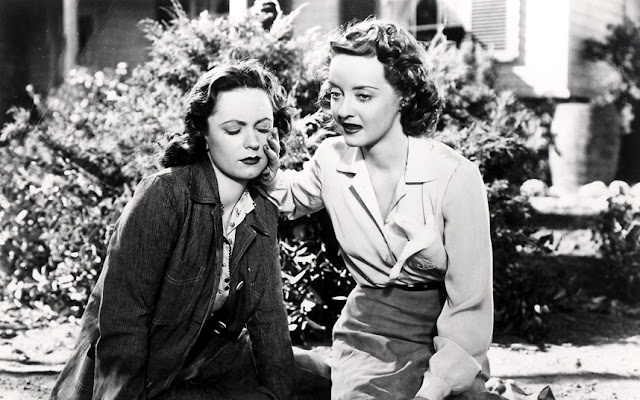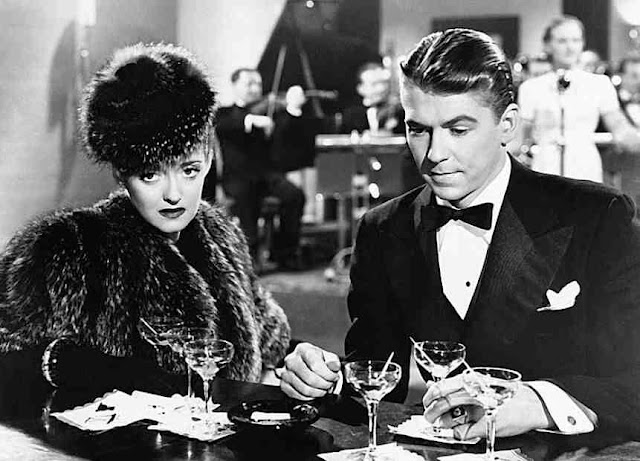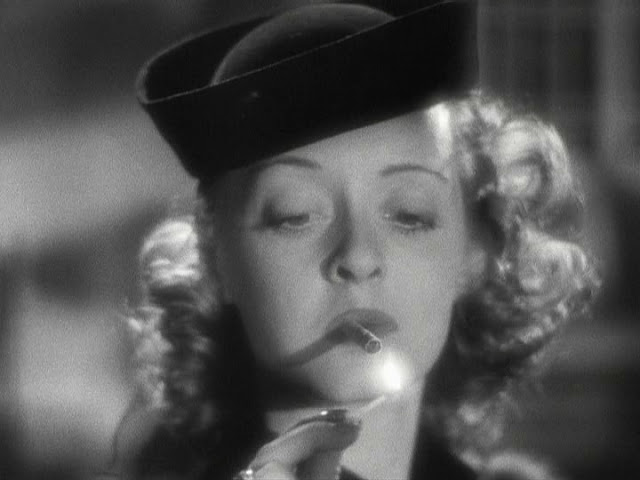David O' Selznick wanted to adapt the play to the BIG SCREEN with Greta Garbo, but Garbo chose another project, instead of entitled ANNA KARENINA (1935). The role of the ill-fated heiress Judith Traherne was originated by Tallulah Bankhead in a Broadway production. The play ran only 51 performances at the Plymouth Theater, due to Bankhead contracting a bacterial infection. Davis confessed that her source of inspiration drew from Bankhead's stage performance, which she emulated to the big screen.
Bette Davis plays heiress Judith "Judy" Traherne of the Long Island Horse set, who smokes and drinks too much. Suffering from a hangover from an all-nighter, Judy is disturbed at 5 AM by her horse trainer Michael O' Leary ( Humphrey Bogart). Annoyed by the presumptuous behavior of her staff member waking her up so early. Judy and her live-in secretary / best friend Ann King ( Geraldine Fitzgerald ) head down to the stable. Michael tries to give his professional opinion to Judy about her horse Challenger. He feels that the horse lacks drive and should be sold. Judy believes that Challenger is a champion steeplechaser and is not going to be convinced otherwise.
The audience gets a glimpse of what kind of person Judy Traherne is. Davis superbly shows her true colors as a self-absorbed young woman who uses her social position to obtain whatever she desires. But her reckless behavior in enjoying life to its fullest without any accountability stems from the loss of her father and the absence of her mother who lives in Paris. The relationship between mother and daughter must be strained because the mother never comes to light even amidst of a personal crisis. Judy is alone, without family and is about to face a hardship like no other.
We also learn that Judy suffers from chronic headaches, which she dismisses as one of her silly headaches. Judy brushes off her painful headache episode and mounts Challenger to prove her trainer wrong. Unfortunately, despite being an excellent horsewoman, Judy ends up having double vision, misjudges, and sends herself and Challenger crashing through the jump instead of over it. Amongst the spectators of the accident is future President of the United States is Ronald Reagan who never appears to be SOBER in any of his scenes. Reagan's character is Alec Hamm who is apart of Judy 's Social circle and constant drinking buddy.
 Judy has no choice but to face her medical condition, which she tried to delude herself from its seriousness. After Dr. Parson's examination, he seeks out a prominent Brain Surgeon Dr. Frederick Steele ( George Brent ). Sadly, Dr. Steele refuses to get involved, because he has closed his practice and is moving to Vermont to devote himself to Cancer research. After Dr. Parsons pleads for Judy 's case, Dr. Steele agrees to see the snobbish heiress for a few minutes before he would depart to the train station.
Judy has no choice but to face her medical condition, which she tried to delude herself from its seriousness. After Dr. Parson's examination, he seeks out a prominent Brain Surgeon Dr. Frederick Steele ( George Brent ). Sadly, Dr. Steele refuses to get involved, because he has closed his practice and is moving to Vermont to devote himself to Cancer research. After Dr. Parsons pleads for Judy 's case, Dr. Steele agrees to see the snobbish heiress for a few minutes before he would depart to the train station.
During the consultation, Dr. Steele witnesses Judy struggle to light her cigarette. Judy 's sight is perceiving several matches instead of just one and can't quite determine where the actual flame is. After a few feverish attempts, Dr. Steele decides to assist Judy in lighting her cigarette. Probing further into the case, Dr. Steele observes burn marks on Judy's right hand from grabbing to light her cigarettes. After an assessment, Dr. Steele concludes that Judy has lost all feeling in her right hand. Dr. Steele decides to postpone his plans to go to Vermont and take on Judy's case.
Dr, Steele convinces Judy to take some tests for he can determine what's wrong with her. When the tests come back, the news is rather bleak. It seems that Judy has a brain tumor and needs brain surgery. Judy has a meltdown after receiving the bad news. Davis is brilliant showing how frightened her character is. When Judy runs up to her dressing table, freaking out in front of the mirror trying to find where the incision will go.
The Surgery was not as successful as Dr. Steele had hope for. In fact, the prognosis is dire, Judy is only expected to live ten more months. Dr. Steele and Dr. Parsona decided to conceal the truth, instead, Judy is given a more cheery outcome that she can anticipate a full recovery.
At the party, the hostess seems to be more than grateful towards the good doctor for saving her life. If we didn't know any better, we would think Judy was flirting with him. Well, it seems we were right. After the party, Judy confesses to Ann that she is in love with Dr. Steele. This puts Ann in a very delicate position. Does she encourage Judy to pursue the good doctor or does she ask the good doctor what to do? If you choose the latter, then you would be correct. Ann goes to Dr. Steele for the answer. She is quite surprised to hear that Dr. Steele reciprocates the feelings. Ann seems skeptical ( for good reason) that Dr. Steele wants to a romantic relationship with the wealthy heiress who has only months to live. Dr. Steele feels that the only thing that matters is that Judy is happy, which means not revealing the truth and marrying her. I guess Dr. Steele has his ethics.
Judy has never known such happiness since she agreed to marry Dr. Steele. Until one day, a bombshell is exposed that could alter their wedding plans and moving to Vermont forever. Judy came to her fiancée's office for lunch, but he's on a house call. Judy decides to wait in his office. There she finds her personal file complete with the case history, carelessly lying around on top of Dr. Steele's desk. Of course, Judy opens the file and is completely mortified by the revelations about her health. Naturally, this sends Judy running out of the office.
Judy doesn't want anyone's pity, certainly not Dr. Steele. She believes that he doesn't love her., but pities her. I'm sure that her MILLIONS factored in there somewhere. When Dr. Steel and Ann meet Judy at the restaurant, they find her a bit peculiar. It becomes crystal clear in ORRY - KELLY HIGH FASHION that Judy knows the prognosis, especially when she mutters the classic line...
"I THINK I WILL HAVE A LARGE ORDER OF PROGNOSIS NEGATIVE."
The next few months, Judy had chartered a course of self-destruction which includes hard drinking and reckless love affairs. After one of Judy's horse shows, Dr. Steele makes another attempt to save Judy from herself. He tells her that he still loves her and wants her to confront her death finding inner peace "beautifully and finely." But Judy is not listening to the good doctor's depressing babble, she much prefers the company of her drinking buddy Alec Hamm ( Ronald Reagan).
It seems that Dr. Steele has put a damper on Judy's party being reminded by her prognosis. Judy heads home but stops by the stable to see her horse trainer Michael. It appears that her doomed horse is going to make miraculous recovering and pull through. This good news does not send this doomed heiress to stand up in cheer.
After a long-winded conversation, Michael starts to get the idea to flirt with his employer. Even though Judy has disconnected from most of the conversation, she knows a pass when she hears one. She responds by " YOU'RE MAKING LOVE TO ME ." Michael quickly reacts to her response as though he was given the GREEN LIGHT and kisses her. Immediately Judy pushes Michael away. After all, even HEIRESSES AT DEATH'S DOOR have their standards, which does not include having an affair with their horse trainers.
Later that evening, Judy finds the good doctor hanging without her drinking pal Alec. Judy reaches out to Dr. Steele telling him that she has accepted her fate and wants to live the rest of her life in peace. It was a very empathetic scene with Davis and Brent who were amidst in their own love affair at the time. Davis was going through a divorce and Brent had just gotten divorced. Davis said " Of all the men she didn't marry. the dearest was George Brent."
Judy marries Dr. Steele and moves to Vermont. Three months later, we see the couple are blissfully happy. Dr. Steele has his laboratory in the barn, where he conducts his cancer research. There is an unintentionally funny scene in which Judy bring her husband lunch to the lab. But the good doctor is not amused, by his wife coming in, disrupting his STERILE environment. My question would be how sterile can a barn be ???
Before Ann could inform Dr. Steele about Judy's worsened condition, Judy pleads with her not to. Judy tells her that they were supposed to leave for New York this evening for a medical research conference. Judy implores that her husband's finding is invaluable to the medical community and must go without her. There is also another reason Judy doesn't want her husband to see her die.
Judy helps packs her husband 's suitcase for the New York Trip. Dr. Steele doesn't want to leave her, not even for one night. The two have never been separated since they married three months ago. It quite apparent that Dr. Steele is upset that his wife is not joining him on the trip, But Judy convinces him to make the journey alone. It's quite astounding though, that Dr. Steele doesn't catch on that his wife has gone blind. The way that Judy gets around by lunging herself at the furniture. How could he miss that? My next question is how good of a doctor is Dr. Steele? or maybe he just turned a blind eye.
Judy says her final goodbye to her husband in an emotional scene which conveys a steady stream of tears. " Nothing can hurt us now, What we have cannot be destroyed. That's our Victory, our Victory over the dark."
 Judy and Ann wave goodbye to Dr. Steele is off to New York. Judy wants to resume the gardening. She wants to plant Dr. Steele's favorite flower HYACINTHS before she dies. While at the flower bed, Judy asks Ann to take care of her husband. I think Judy is giving Ann, her approval to married Dr. Steele in the future. Judy then summons Ann to leave her, who hysterically runs off, leaving a blind woman to defend for herself. Judy knows that she must face what coming next on her own.
Judy and Ann wave goodbye to Dr. Steele is off to New York. Judy wants to resume the gardening. She wants to plant Dr. Steele's favorite flower HYACINTHS before she dies. While at the flower bed, Judy asks Ann to take care of her husband. I think Judy is giving Ann, her approval to married Dr. Steele in the future. Judy then summons Ann to leave her, who hysterically runs off, leaving a blind woman to defend for herself. Judy knows that she must face what coming next on her own.
FILM FACTS
Greta Garbo was David Selznick's first choice for the big screen adaption of DARK VICTORY in the leading role of the terminally ill heiress Judith Traherne.
Tallulah Bankhead as Judith Traherne in the original Broadway Production of DARK VICTORY in 1935.
Merle Oberon was considered for the role of Judith Traherne in DARK VICTORY. But she was overlooked for suing David Selznick for breach of contract because he promised her the lead in the film THE GARDEN OF ALLAH (1936). The role instead went to Marlene Dietrich. In the end, Oberon dropped the charges in 1940.
George Brent and Bette Davis became romantically involved during the making of DARK VICTORY (1939). Davis just ended affairs with Howard Hughes and William Wyler, while her husband Ham Nelson filed for divorce. Davis's affair with Brent lasted one year while making three films together. Davis considered marrying Brent but thought that the relationship would not last. Davis confessed that "Of the men I didn't marry, the dearest was George Brent."
A few years before Davis's crusade, Gloria Swanson tried to get the play DARK VICTORY to the silver screen with herself in the leading role.
Ronald Reagan was the announcer for The Chicago Cubs when he took a screen test for Warner Brothers Studio in 1937. Reagan became a contract player for seven years which lead to a supporting role in the film DARK VICTORY (1939) with Bette Davis.
DARK VICTORY (1939) would be Humphrey Bogart's last film of the six films ( BAD SISTER (1931), THREE ON A MATCH (1932), THE PETRIFIED FOREST (1936), KID GALAHAD (1937), and THE MARKED WOMAN (1937) that he would make with Bette Davis.
Director Edmund Goulding came up with the idea for the Famous Cigarette Lighting Scene. Goulding wanted to show Davis struggle to light her cigarette to convey Judy's vision problems. Goulding states: " When BETTE DAVIS can't light up her own cigarette. You know there something seriously wrong !!!"
Henry Travers who played Dr. Henry Parsons in DARK VICTORY(1939) is best known for his role as Guardian Angel Clarence Odbody in IT'S A WONDERFUL LIFE (1946).
BEWITCHED's Elizabeth Montgomery made the TV version of DARK VICTORY (1976) w/ Anthony Hopkins. Ironically, Montgomery and Bette Davis were real life friends, in fact, Davis jokily referred to her as " illegitimate daughter."
The Vermont scene was filmed in San Fernando, California. The FAKE snow was made from CORN FLAKES and WHITE LEAD.
The role of Ann King ( played by Geraldine Fitzgerald) did not appear in the original play DARK VICTORY written by George Brewer Jr. The Best Friend role was written in for the screen adaption by Director Edmund Goulding.
IMMORTAL DIALOGUE
" Hello, there. Is this the HOUSE? I've been trying to reach you ."
!!!"
THE CAST
Judith Traherne ... BETTE DAVIS
Dr. Fredrick Steele ... George Brent
Michael O' Leary ... Humphrey Bogart
Ann King ... Geraldine Fitzgerald
Alec ... Ronald Reagan
Dr. Parsons... Henry Travers
Carrie ... Cora Witherspoon
Miss Wainwright ... Dorothy Peterson
Martha ... Virginia Brissac
Col. Mantle ... Charles Richman
Dr. Carter ... Herbert Rawlinson
Miss Todd ... Fay Helm
Lucy ... Lottie Williams
MY BOTTOM LINE IS...
DARK VICTORY (1939) is a three-handkerchief melodrama, which ranks amongst Bette Davis's best films. The role of the dying heiress who refuses to acknowledge her illness is tailor-made for Davis. Her insight into this role is the perfect vehicle for her was spot on, which would lead to an Oscar nomination. By this time, Davis was not a stranger to the Academy Awards. Davis had been nominated four times for Best Actress with two wins. You can clearly see in the film that her muse for Judy Traherne was indeed Tallulah Bankhead. Davis would later in her career, revisit Bankhead as a muse in another role as Margo Channing in ALL ABOUT EVE (1950).



































No comments:
Post a Comment
Note: Only a member of this blog may post a comment.